#or think the terminology I used is incorrect or inaccurate
Explore tagged Tumblr posts
Note
You can talk about the issues with people often conflating the situation with native americans like me to those of the palestinian people and not realizing they're differing situations- without being just vitriolic and hateful towards USA natives. The idea addressing colonialism is bad is such a privileged take why are you putting it in scare quotes? Colonizers are bad regardless of how it happened. It comes off to me as deeply racist and insensitive to mock native people just because some people misappropriate our terminology.
I wanna come in here and be very open about the clarification here. I don’t think addressing colonialism is bad. Seems like you might be new around here, because addressing colonialism is a big focus of this blog and of my personal life.
The quotation marks do not, in any way, serve as a mockery of Native terminology or a condemnation of decolonization. The original ask was focused on how non-native misinterpretation of decolonization forced everyone to accept a label of either “native” or “colonist”— never both, never neither. That extremely limited and binary labeling is the only reason the quotations exist. Obviously, there are more complex nuances to decolonial terminology, because that binary is itself a form of colonial thinking. I was in no way intending to say that the terms were bad or incorrect, just that they are often used by colonial-minded activists harmfully and inaccurately.
The quotation marks are intended to easily and visibly show misuse of terminology, so as not to confuse it with accurate use. That’s something I do on here all the time, especially with Zionism. It’s an incredibly complex term that most USActivists misunderstand. A secular Labour Zionist and a Religious Greater Israel Zionist will probably find that they don’t actually agree on nearly anything. But goyim on tumblr who don’t understand the word use it to mean “one of those Nazi Jews that I don’t agree with”. When referencing their use of the term, it’s formatted as “Zionist”.
That’s not to say Zionism is fake or bad or shouldn’t be done. (It also doesn’t mean it’s good and should be done!) There are some parts of Zionism I agree with, and some parts I don’t agree with. The use of quote marks around “Zionism” are politically and morally neutral. It’s just to indicate that the person using the term is not using it accurately.
I hope this clears up the misunderstanding, and I’m sorry I gave off the impression that I don’t value, support, and and work towards decolonization. Please let me know if you have any other questions!
25 notes
·
View notes
Text
List of 400+ Kinks & Tropes
Below is an alphabetized and roughly categorized list every major kink, trope, and sex act used in fiction that I can think of (and I can think of quite a few). It certainly doesn’t have everything, but I’ve never found a more comprehensive list.
This list came about because I wanted to create a survey for my friend group so we could figure out exactly what we each like and dislike in our fiction for the purpose of gift fics, exchanges, and reccing. Is it normal to ask your friends how they feel about felching and mpreg and cannibalism? Probably not, but it sure is fun learning new things about each other and it’s good information to have if you want to write a fic for someone!
To make the list easier to navigate I've broken it down into the following sections (note many kinks and tropes could fit in multiple categories but I did my best to group them where I thought they made the most sense):
general sex acts
general sex types and locations
bodily fluids and excretions
body and body modification
clothing
BDSM
pain, torture, and horror
dub-con, non-con, and unhealthy dynamics
alternate universes
misc kinks
misc tropes and genres
Feel free to use this list to create your own surveys or as a reference for writing challenges, drawing inspiration, or whatever you want!
General Sex Acts
anal fingering
anal fisting
anal sex
blowjobs
cunnilingus
deep throating
double penetration
face fucking
face sitting
facials
handjobs
intercrural sex
masturbation
pegging
rimming
scissoring
threesome/multi-partner
toys - dildos
toys - plugs
toys - vibrators
vaginal fingering
vaginal fisting
vaginal sex
69ing
General Sex Types & Locations
angry sex/hatefucking
car sex
casual sex/fuck buddies
distant/distracted sex
drunk sex
gentle sex
mirror sex
phone sex
pool/bathtub sex
public sex
rough sex
safe sex
sex against a wall
sexting
shower sex
sleepy sex
Bodily Fluids & Excretions
bladder desperation
blood
bukkake
creampie
cum play
diapers
drool/drooling
lactation - female
lactation - male
felching
flatulence
menstrual blood
scat
snot/mucus
snowballing (cum swapping)
spit as lube
spitting in mouth
sweat
swallowing blood
swallowing cum
swallowing urine
tears/crying
vomit/vomiting
watersports
Body & Body Modification
anal gaping
anal prolapse
armpits
ass worship
belly/throat bulge
body hair
body worship
breast worship
cock worship
enemas
feeding/stuffing
fingers in mouth
feet
footjob
hair brushing/braiding
hair cutting
hair pulling
hickies
inflation
mpreg
nipple play
piercings - body
piercings - facial
piercings - genital
pregnancy
scars
shaving
tattoos
titty fucking
weight gain
Clothing
boot aesthetics
boot licking
boot stepping
clothed sex
corsets
costumes
crossdressing
formal wear
gloves
high heels
jewelry
latex
leather
lingerie
makeup
military uniforms
slutty clothes
underwear/panties
BDSM
aftercare
anal hooks
bathroom permission
begging
blindfolds
bondage - heavy
bondage - light
brat taming
breathplay
cages
chastity devices
cock rings
cockwarming
collar - dog
collar - choke
collar - prong
collar - shock
collaring - private
collaring - public
consensual non-consent (CNC)
daddy kink
discipline
dom female
dom male
edging
electric stimulation
forced orgasms
free use
fucking machine
gag - ball/bit
gag - medical/dental
gag - ring/spider
gag - phallic
gag - tape
hand feeding
handcuffs
harem
harnesses
hoods
human furniture
humiliation - private
humiliation - public
kink negotiations
kneeling
leashes
master/slave
masks/muzzles
orgasm denial
pet play
punishment
roleplay - adult baby
roleplay - ageplay
roleplay - animal
roleplay - hunter/prey
roleplay - medical
roleplay - teacher/student
role reversal
sadism/masochism
safewords
sensation play
sensory deprivation
shibari/rope art
slave/pet training
sounding
spreader bar
straightjackets
submissive female
submissive male
suspension
temperature play
tickling
traffic light system
Pain, Torture & Horror
amputation
beating
biting
blood as lube
blood loss
bloodplay
body horror
branding
broken bones
bruises
burns
caning
cannibalism
choking
cock & ball torture (CBT)
dislocation
electrocution
eye trauma
fear
figging
fingernail removal
fire play
flaying/skinning
fuckpotato (quad amputee)
genital mutilation
gore
head injury
interrogation
knife play
medical experimentation
mental torture
mouth sewn shut
necrophilia
needles
nipple clamps
nullification/castration
pain - extreme
pain - moderate
pain play
painful sex
poisoning
riding crops
scratching - deep
scratching - light
self-asphyxiation
self-cutting
self-mutilation
slapping - face
slapping - genitals
snuff/murder kink
spanking
starvation
suffocation/asphyxiation
suicidal thoughts
suicide
teeth pulling
tongue trauma/removal
tsumification (what is this?)
vore
waterboarding
waxplay
whipping
wounds - major
wounds - minor
woundfucking
Dub-Con, Non-Con & Unhealthy Dynamics
abuse - child
abuse - emotional
abuse - physical
abuse - verbal
brainwashing
codependency
coercion/blackmail
conditioning
dehumanization
domestic violence
drugging
forced crossdressing
forced enema
forced feeding
forced infantilism
forced masturbation
forced pregnancy
forced servitude
forced verbal feminization
fuck or die
gang rape
gaslighting
grooming/manipulation
hypnotism
issues - addiction
issues - body image
issues - food
issues - mental health
issues - self-esteem
kidnapping/abduction
lima syndrome
mind break
mind control
mutual non-con
non-con bondage
non-con hair cutting
non-con piercing
non-con tattoos
non-con touching
non-con somnophilia
power imbalance
rape with an object
rape victim female
rape victim male
rapist female
rapist male
sex pollen
stockholm syndrome
stuck & fucked/kabeshiri
Alternate Universes
alpha/beta/omega
animal-human hybrids
coffee shop
college
crossover/fusion
dystopian
fantasy/supernatural
gender swap
high school
historical
modern
no powers
pornstar/camstar
prison
royalty
sex worker/hooker
trans character
Misc Kinks
age difference
aphrodisiacs
barebacking
bestiality
breeding/impregnation
claiming/marking
cock milking
competence kink
coming in pants
coming on command
coming untouched
consensual somnophilia
cuddling
degradation
dirty talk
drug use
erotic dancing
exhaustion
fighting/wrestling
first time with partner
food play
frottage/grinding
furry
glory hole
guns/weapons
gunplay
incest
infidelity/cheating
jealousy
lapdances
licking
massages
micro/macrophilia
monsterfucking
multiple orgasms
mummification
object insertion
objectification - female
objectification - male
olfactophilia (scent kink)
open relationships
oral fixation
overstimulation
oviposition
pet names
praise kink
promiscuity
prostitution
public groping
sex tapes
sexual inexperience
shotgunning (sharing smoke)
size difference
size kink
sleep deprivation
sloppy seconds
smoking
spitroasting
stripping
sugar daddy
teasing
tentacles
underage - children
underage - teens
virginity
voyeurism
watching porn
wet dreams
wet & messy fetish
xenophilia
Misc Tropes & Genres
alcoholism
almost getting caught
amnesia
arranged/forced marriage
bad dirty talk
bad sex
bathing/washing
body swap
canon divergence
crack fic
de-aged character
domestic fluff
established relationship
enemies to friends to lovers
enemies with benefits
friends to lovers
friends with benefits
fake/pretend relationships
gender identity fic
getting caught
ghosts/paranormal
hanahaki disease
happy ending
healthy relationships
homophobic language
hurt/comfort
kid/baby fic
knotting
love triangles
magical healing cock
major character death
merpeople
miscommunication
mistaken identity
multiverse
only one bed
pairing - F/F
pairing - M/F
pairing - M/M
pairing - poly
pining - mutual
pining - unrequited
possessive
POV 1st person
POV 2nd person
PTSD
reader insert fic
real person fic (RPF)
religion fic
selfcest
sick fic
slice of life fic
soulmate identifying marks
soulmates
telepathic/empathic bonds
time travel
trapped together
unreliable narrator
unresolved sexual tension
vampires
werewolves
wing fic
zombies
#if you think I'm missing anything important#or think the terminology I used is incorrect or inaccurate#let me know!#these are obviously not all my kinks so I'm sure I'll get some things wrong#also some of these may seem really niche while others are more broad#but keep in mind I originally designed this list for my specific friend group#and my friends and I have very specific... tastes#reference#writing#my words
602 notes
·
View notes
Text
Copinglink Ask Game!
I wanted to make some more ask games for friends since the last one seemed to be well received!
Also, to those who sent me asks for the other ask games, I’ll probably answer those soon. I just wanted to let others have the spotlight for a while!!
(Forgive me if I use any incorrect terminology! I’ve seen the term “linktype” used fairly frequently, though I’ll correct it if it’s outdated or inaccurate in any way!)
(Also, apologies if any of the questions are redundant!)
1. How did you discover your copinglink/linktype? How many do you have?
2. When you began to identify with this character/animal, was it a conscious effort or a subconscious relation?
3. Do you project your headcanons onto this character, or do they already match you pretty well already?
4. If you have kintypes as well, do you think your kintype would get along with your linktype?
5. Are any of your linktypes the same general species as your kintype?
6. Do you like to be referred to as your linktype’s name as a nickname?
7. Is your ‘link “the ideal you” or just a type of character you resonate/relate to?
8. Does your linktype affect your identity as strongly as your kintype?
9. Do you have any decorations/merchandise of your linktype?
10. Do you have any aesthetic/fashion preferences that remind you of your linktype?
11. Do any of your linktypes also give you “kin feels”? (Copinglink is separate from ‘kin, though some may pick linktypes that remind them of their kintypes).
12. Are any of your friends’ kintypes the same as your linktype? Or vice versa? If so, did you choose your copinglink because it reminded you of someone you care about?
13. Do you have the same copinglink as any of your friends? Do any of your headcanons match up?
14. Do you participate in any of the “fluffy” side of copinglink? Moodboards, aesthetics, playlists, etc.?
15. As a copinglinker, do you consider yourself to be part of the greater “alterhuman” umbrella? Or do you want to remain separate from them?
16. Do ever dream of being your copinglink?
17. Would you/have you dressed up as your linktype for any occasion? Halloween, costume parties, etc.?
18. When did you first discover your copinglink?
20. Answer a random question as your copinglink!
21. Do your linktype’s headcanons differ greatly from canon?
22. Any powers/abilities your linktype has that you wish you had?
23. What’s your general opinion of your copinglink?
24. Do you consider your copinglink a fundamental part of your identity or just an interest?
25. Finally, how has taking on a copinglink positively affected your life? Any people you met because of it? Any hobbies taken up?
6 notes
·
View notes
Text
A fetus is a child is a baby is a patient - 5 reasons to use the terms interchangeably
Today's guest post is written by John Bockmann. You can also view his article as a Twitter thread here. My older daughter, Emily, at 8 weeks’ gestation: “BABY.” If you’ve ever debated abortion, you’ve probably noticed it’s nearly impossible to discuss the actual topic. Instead, the exchange rapidly devolves into accusations—often, that you’re using inaccurate terminology. This irate doctor’s tweet is a good example: “A fetus is not a baby. A fetus is not an unborn or a preborn baby or child...” But that’s incorrect: a fetus is a child is a baby is a patient, and the objection is strange if it’s meant to clarify medical terminology. But it’s not. It’s meant to rattle opponents and justify abortion, or at least obscure it. Let’s take a closer look. 1. First, crucially: abortion is killing. Since killing is not medical care, there is no requirement to use medical terminology and a lot of reasons to avoid it. 2. Second, nomenclature is an odd sticking point if the woman’s bodily autonomy is our only concern. What we call her womb-dweller—fetus, parasite, baby—should be irrelevant under this paradigm. Paradoxically, then, squabbling about terminology screams the fact that there is a baby, a morally relevant person, killed in every abortion. (Irate doctor strikes again) 3. Third, the terms “maternal” and “maternal patient,” commonly used in reference to the pregnant woman, imply she is a mother, which implies she has an unborn child. “Pregnant” itself means “with child”—“having a baby or babies developing inside the womb.” 4. Fourth, the fetus is a patient in her own right. Sir Albert Liley, an atheist who performed the first successful fetal blood transfusion in 1963, conceived the medical science of fetology. In 1966, Journal of the American Medical Association noted his contribution, observing that “the fetus is a treatable patient.” “My own practice makes it very clear,” he wrote in 1974, “that in modern obstetrics, we are caring for two individuals, mother and baby.” Perhaps no two individuals illustrate Liley’s point more vividly than Julie Armas and her son, Samuel Armas. The two underwent surgery to repair a lesion on Samuel’s back when he was a 21-week fetus. During surgery, he poked his left hand through an incision in his mother’s uterus and reflexively grabbed the surgeon’s finger. He took his first breath 15 weeks later. Indeed, we are caring for two individuals. Maternal-fetal medicine is booming. Fetal surgery occurs at centers around the world. Williams’ Obstetrics 16th Edition said it well in 1980, and it’s even truer today: “Happily, we have entered an era in which the fetus can be rightfully considered and treated as our second patient.” 5. Finally, and obviously, the irate doctor is mistaken: "fetus," "baby," "child," and even "patient" are standard terms for an unborn human being. In fact, “child” is the original, specific term for a prenatal human. The wider sense of “young person before the onset of puberty” came later. Either sense is appropriate today: “Child: an unborn or recently born person,” says Merriam-Webster. The Oxford English Dictionary agrees. But even if we consent to only call the unborn human-thing a “fetus,” which simply means “offspring,” the definitions for those terms include “baby” and “child.” We’re back to our original position. As we would expect, there are many, many articles in professional and consumer-oriented literature referring to the fetus as a baby or child. Here are some. Google Scholar has 22,800 results for “unborn baby” and 73,500 results for “unborn child.” Mayo Clinic’s “Pregnancy week by week” includes 10 mentions of baby. Babycenter’s version mentions baby 55 times. Royal College of Obstetricians and Gynaecologists’ 2010 study on fetal pain—one of two most frequently cited articles on the subject—calls the fetus a “baby” 27 times. The United Nations’ Convention on the Rights of the Child affirms that “the child, by reason of his physical and mental immaturity, needs special safeguards and care, including appropriate legal protection, before as well as after birth.” Cleveland Clinic’s summary of fetal development includes 83 mentions of baby: “At the moment of fertilization, your baby’s genetic make-up is complete, including its sex.” Judith Arcana, an abortion pioneer and advocate, calls the aborted fetus “a baby whose life is ended,” adding, “We—in the States—have dealt heavily, up to now, in euphemism…we have been unwilling to talk to women about what it means to abort a baby…I think this is a mistake tactically and strategically, and I think it’s wrong. And indeed, it has not worked…” Leroy Carhart, a physician who has performed abortions for many years, says: “I think that it is a baby. I use [the term] with patients.” So the fetus is a child is a baby is a patient. What, then, is behind the insistence that “A fetus is not a baby”? I think it’s an attempt to: protect oneself psychologically from the violent reality of abortion. Inserting a cold, clinical term for a familiar, sympathetic one creates an emotional buffer. As Jesse Jackson said in 1977, when he was pro-life: “They never talk about aborting a baby because that would imply something human. Rather they talk about aborting the fetus. Fetus sounds less than human and therefore can be justified.” intimidate and stifle pro-lifers to keep them on the back foot. If pro-lifers don’t know the proper terminology or are misrepresenting it, then they’re not credible, their arguments may be dismissed, and the illusion of killing-to-heal can metastasize. lend medical legitimacy to killing--an approach with a long and sordid history. Regardless of what we call a tiny prenatal human, though, I think few of our foes intellectually doubt the humanity of the fetus. Most of the resistance is instead emotional, and inaccessible to reason. The avoidance is psychologically protective for them, but it exacts a toll, and at least some of them yearn to be led out of their views. But they won’t submit to someone they despise. The way forward, then, is to engage them on an emotional level first: cheerfully, wryly, calmly, curiously, firmly, perhaps with a wink, but always with kindness and confidence. Then, and only then, roll out facts like these. Proudly. https://blog.secularprolife.org/2021/08/a-fetus-is-child-is-baby-is-patient-5.html
0 notes
Text
Cupkayke Rewatches/Liveblogs Boueibu!
Season 1, Episode 3

So I dropped off the face of Tumblr for awhile, sorry guys! I also rewatched the entirety of Yuri on Ice with my boyfriend and he now likes ice skating anime so that took some time lol But I am back JUST IN TIME FOR YUMOTO’S BIRTHDAY OMG HAPPY BIRTHDAY PRECIOUS CHILD. So, have a liveblog/collection of my stupid thoughts about one of the more ridiculous episodes! Yay!
Also, I apologize in advance- some of this episode’s subtext led to an impromptu dissection of the boys’ sexualities/orientations and there are some brief mentions of unsavory teachers (because what kind of teacher holds a pretty boy contest???) so if any of my terminology/speculation is incorrect or you find any of my discussions potentially triggering or in need of tags PLEASE inbox me and I will tag the post as such/correct any misinformation! I am a literature student- I like to analyze things. Sometimes I get carried away~
I SAW THE PREVIEW IMAGE FOR THIS EP ON CRUNCHYROLL AND IMMEDIATELY THOUGHT ‘HERE WE GO I REMEMBER THIS EPISODE IT’S GONNA BE A TRASH PARADE AND WTF CITY LET’S GO’

Okay- I always wondered about the pretty boy contest… like why? What purpose does it serve? Why are there posters put up in a fucking BATHHOUSE advertising the local boys’ high school’s PRETTY BOY CONTEST. .3 seconds into the episode and it’s ridiculous.

What do you mean ‘weight with the ladies’ c’mon man I have a hard time believing you care ANYTHING about ‘the ladies’ -eyebrow waggle-

He’s doing pirouettes in a towel… okay seriously bro I danced ballet for like 10 years and I never pirouetted in a towel OKAY THAT’S PROBABLY A LIE BUT YOU CAN’T PROVE IT OTHERWISE

"EWWWW TEACHER DICK”

Aww Yumoto. So innocent. So naive. So willing to point out he just saw his teacher’s penis-

...well that’s an odd question. Yumoto why would you ask-

Oh, shew, it’s because you’re not ashamed of bodies! How sweet and innocent and refreshi-

WAIT BACK UP NEVERMIND YUMOTO WTF THAT’S CALLED VOUYERISM

Those are the faces of some senpais that just came to the realization that their kouhai has probably been checking them out.

Well he got dressed fast.
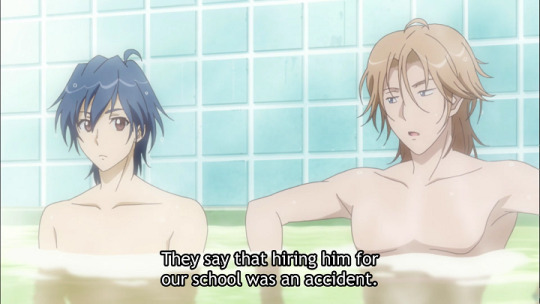
How do you hire someone by accident?

Took the words right out of my mouth, Atsushi.
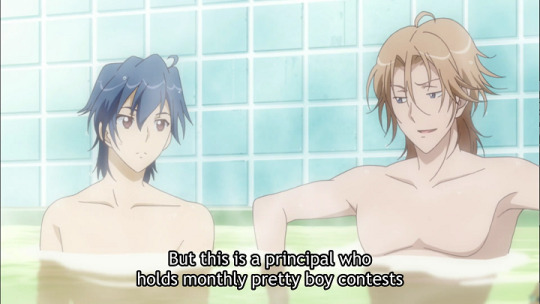

This is disturbing on several levels. Pedo Principal? -shudders-

FEET SHOULD NOT BEND THAT WAY

GUYS. GUYS. GUYS. AKOYA AS A BALLET DANCER OMG. IMAGINE. HAS THIS BEEN DRAWN? THIS NEEDS TO BE FANART SOMEWHERE. HE’D BE SO PRETTY JUST IMAGINE HIM IN TIGHTS BEING THE PRINCIPAL MALE LEAD IN SWAN LAKE OR FUCK EVEN IN A FUCKING TUTU BECAUSE HE’D BE GORGEOUS IN EITHER ROLE I CAN’T EVEN AWKEJFLASJFASLDJFOSIJFOAJ -Cupkayke Explodes-


Arima speaks truth

Io why do you have an exact copy of the calculator I use at work that’s terrifying.



RYUU YOU ARE LYING YOU GO TO AN ALL BOYS SCHOOL THAT IS APPROXIMATELY 0% WOMEN TRY AGAIN

Io looks so disappointed he can’t talk numbers with Ryuu

THEIR CHEESY CATCHPHRASE AGAIN
Side note I feel like the quirkiness of the school got toned down in later eps but perhaps that’s my faulty memory. Which is why I’m rewatching it lol.

Pretty and savage AF

PINK RIVALRY! I mean seriously, “you can’t seem to take your eyes off of me?” Maybe not even a rivalry but something else ohohohohohoh I’m alone on this ship
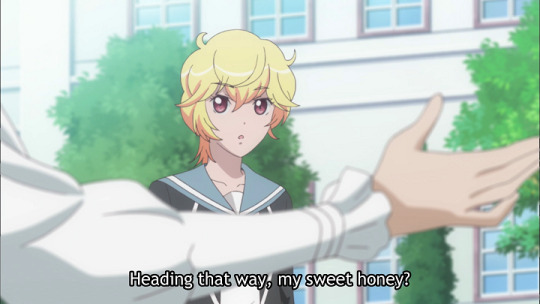
Okay this creepy teacher apparently calls all the boys ‘sweet honey’ which is disturbing on its own level but that got cranked up to 11 on the creep scale when he referred to YUMOTO as sweet honey.
Yumoto is a precious cinnamon roll you freak
Paper airplane contest lololol why do I feel like this happened at my school back in the day?


Wombat sounds like a jealous lover lolol


OH BOY! PUNS!


RYUU AND AKOYA TIED FOR THIRD???
HOW DOES AKOYA NOT WIN IN THE LINEUP OF THE SC???
LIKE SERIOUSLY KINSHIROU????
AKOYA IS TEN TIMES PRETTIER!
This school must have a thing for ice princes I s2g

En's boredom is dangerous. I mean... the face says it all.
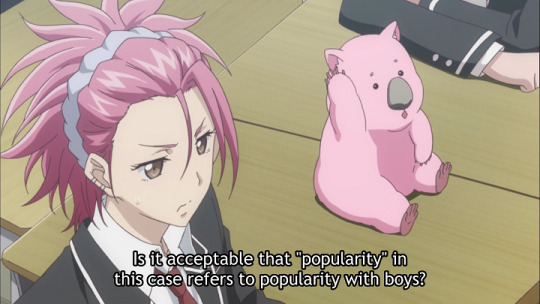
Ryuu is all “this is NOT up my alley”
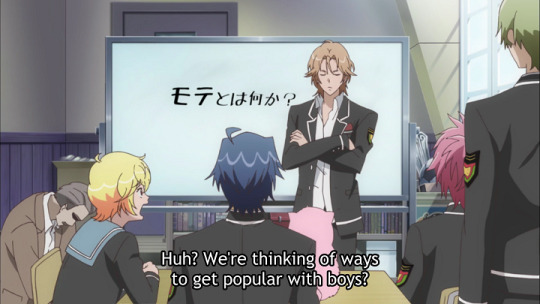
A bit slow on the uptake, Yumoto.

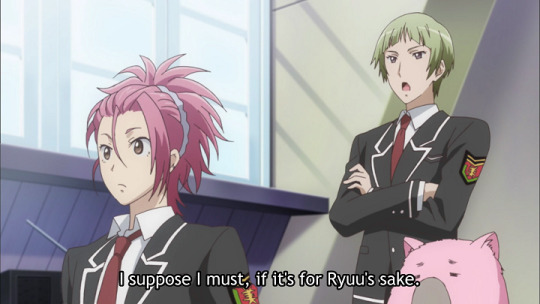
Io that’s so sweet... I guess? Well Ryuu seems to think it is- look at his face!

...nevermind. His expression is all “Thanks... I guess...”
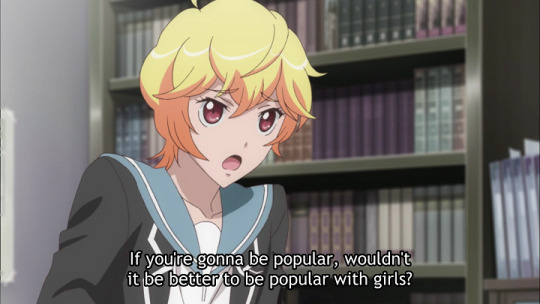
Either Yumoto was hoping his senpais would teach him how to be popular with the ladies, or he’s just confused as to what in the hell it is that older boys want. This entire scene is just a clusterfuck of innuendo BUT I’M GONNA OVER ANALYZE IT ANYWAY.
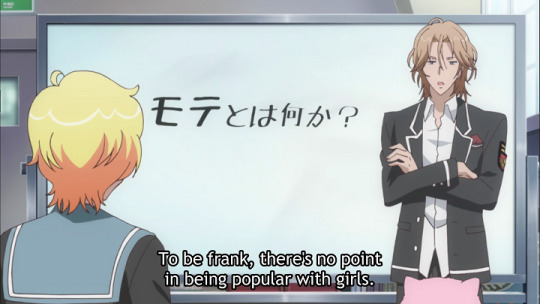

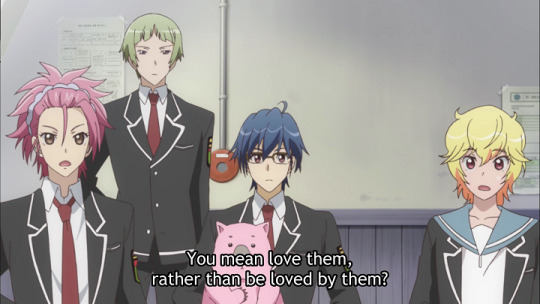

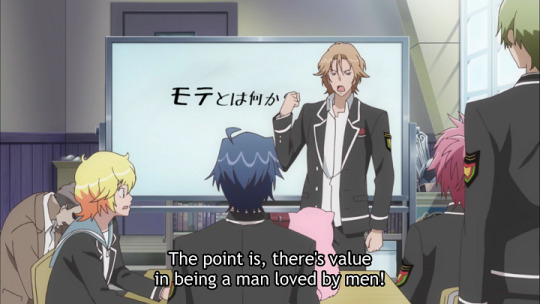
The surface meaning of En and Atsushi’s statements here- or what the audience is supposed to get- is that being popular with girls will only get you so far. It may get you ‘love’ but having a girlfriend means jack squat if you don’t have guy friends (most likely to brag to).
It also could be taken that En at least would rather appreciate women than exert his energy into making them lust after him, which is rather sweet if you think about it.
Atsushi’s point also draws attention to the fact that stereotypical displays of machismo are much more well-received by other men than women- ie outward displays of strength, aggression, bragging about sexual encounters... er- yeah. No need to go on, there.
So. In order to be a well-rounded man, a man needs to be popular/be admired by other men! So you aren’t a lonely loser the rest of your days.
Buuut... because I’m me... LET’S LOOK AT THE SUBTEXT IN RELATIONSHIP TO THEIR SPECULATED SEXUALITIES 8D
En basically says straight up it’s more beneficial to be admired by men. Putting aside the above statements about admiring women... En’s likely gay. Fosho.
And the top screencap of Yumoto, instead of just clarifying his senpai’s intentions, that could mean that he’s more interested in girls. HOWEVER-
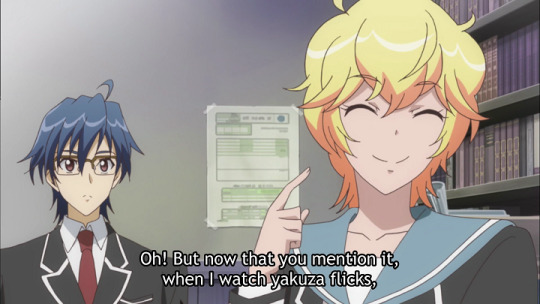

With a c: face, Yumoto admits his heart flutters watching rugged young men!

Bi Yumoto anyone? (He also unironically uses the word ‘flicks’ but that’s either a translator thing or another example of a mysterious dialect but ON TOPIC-)
At least within the context of this scene, Yumoto implies he’d be interested in being popular with girls and he is attracted to at very least a certain type of man. Buuut the rest of this episode (which I will get to later) potentially directly contradicts this implication as to Yumoto’s romantic and/or otherwise attraction.
It’s too bad that we don’t get Ryuu or Atsushi’s opinions on the matter- although Ryuu makes his attractions pretty clear just from his character (and then the subtext with Io). Atsushi is a bit of a mystery, for now.
As for Io, we get this exchange-


Le sigh. Io is moneysexual. Anyway...
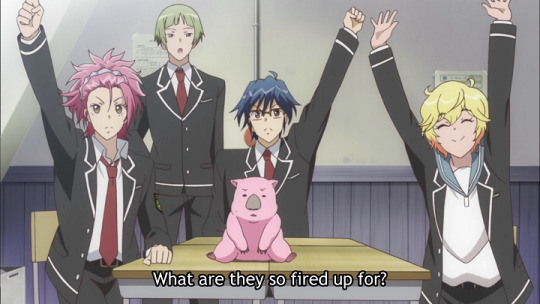
Wombat so salty- I guess helping Ryuu win a contest is more entertaining than being superheroes.
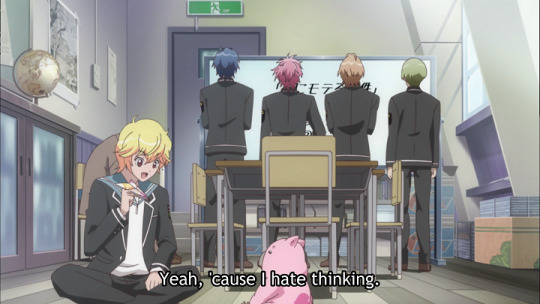
Me about halfway through this post


En's expressions in this scene are great.
Tho does anyone else now headcanon En as really into athletics when he isn’t being lazy?
Like him really liking competition just fits so well but without a goal he’s just like ‘why bother’

Atsushi sounds so awkward calling him Yufuin
“I can’t just announce him as Enchan that’s weird but I don’t think I’ve ever said his last name ughhhhhhhhh”

Io is NOT playing by the unspoken one urinal in between rule
ALSO I JUST NOTICED YOU CAN SEE THE GUY ON THE LEFT ACTUALLY PEEING WTF
Water go swoosh swoosh
Also their bathrooms are fancy AF

GDI why does Io make the best seduction face
Even tho it’s more predatory here still...

THEY WERE REALLY HEAVY HANDED WITH THE INNUENDO IN S1

The triplets WHY ARE THEIR EYES SO WEIRD
WHAT IS IT WITH THIS SHOW AND SIDE CHARACTERS WITH WEIRD EYES

Ryuu so destructive lol
I TAKE BACK WHAT I SAID ABOUT EN BEING ATHLETIC RYUU DOES FUCKING KARATE
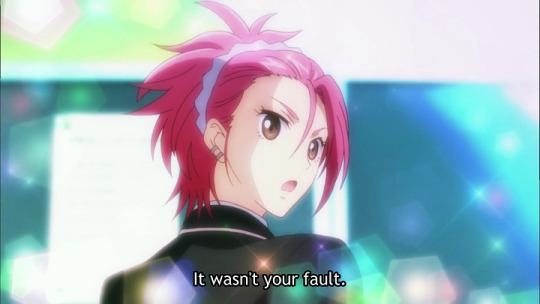
Sparkles

Ibushi is still savage AF

I had to giggle and cap his character card because the image of Atsushi doing gigantic jigsaw puzzles was adorable

YOU’RE A TEACHER WHY DO YOU WANT TO BE A PRETTY BOY?
LIKE SERIOUSLY WHY DO YOU WANT TO BE VALIDATED BY HIGH SCHOOL STUDENTS
Did he get scorned and that’s why his self esteem is in the toilet???
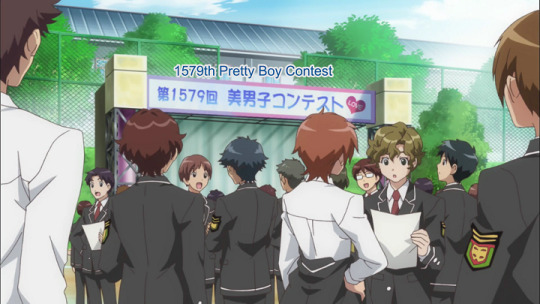
1579th pretty boy contest??? Damn Pedo Principal is thirsty AF I am still shuddering at the implications
Tho seriously that’s -does math- ONE HUNDRED AND THIRTY ONE YEARS OF PRETTY BOY CONTESTS WHAT THE FUCK
And that isn’t taking into account there would probably be a month or two where school isn’t in session on the 27th to have the pretty boy contest. Like December wouldn’t they be on break? And don’t they have a summer holiday at some point?
IT ISN’T JUST ONE PEDO PRINCIPAL IT’S A DYNASTY
EWWWWWWWWW.


YUMOTO AND RYUU BROTHER RELATIONSHIP I FRIENDSHIP IT LOOK RYUU IS BLUSHING

Yumoto knows he’s a lil shit

What the fuck kind of sound effect is swan swan???
I’m suddenly reminded of Kronk doing his own theme music-
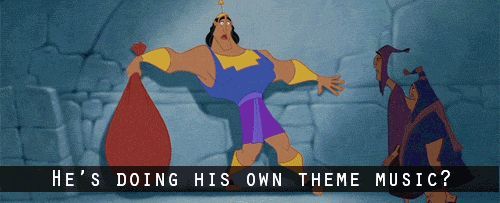

Ryuu so salty he wanted to know the winner
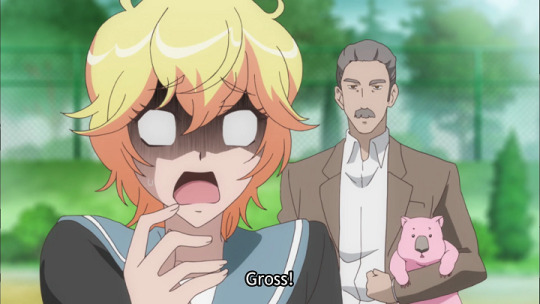
Yumoto that writhing mob of students is pretty gross I agree



SO ZUNDAR WANTS THE ENTIRE WORLD TO BE GAY
THAT’S HIS EVIL PLAN TURN EVERYONE GAY
HE SOUNDS LIKE A SHITTY GROSS POLITICIAN

With that shot angle I was just waiting for him to lay a fucking egg but thankfully that didn’t happen

The subtitle is inaccurate- he actually said ‘GIMME HUG’ which is slightly more unsettling.

EN YOU WANT TO MARRY IT WTF

Yumoto still just like c: “I have no idea what’s going on”

I NOW PRESENT TO YOU THE BEST BOUEIBU SCREENCAPS IN THE HISTORY OF SCREENCAPS

ATSUSHI SO GRACEFUL

SO ROMANTIC
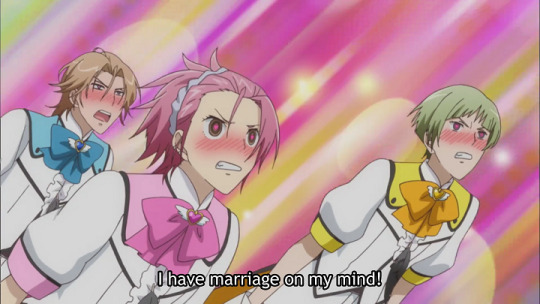
EN IS JEALOUS
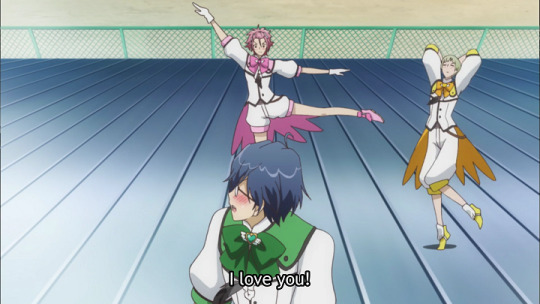
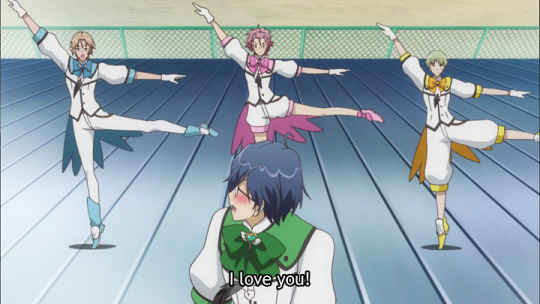
THEY’RE ALL RIDICULOUS

Speaks for itself
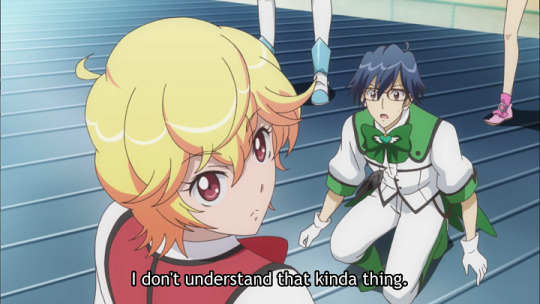
And here is where Yumoto contradicts his earlier implications. Okay. 1) Writers make up your minds, although 2) ...shades of gray here.
Perhaps Kurotori’s feather spell represents sexual love (Eros for all you YOI fans~) and Yumoto is either a) too young/innocent to understand or b) somewhere on the ace spectrum. The others were affected because they are either simply older than Yumoto/past puberty or allosexual to the point where the spell could manipulate their feelings despite their existing attractions whatever those may be.
Yumoto’s earlier comments, then, could be taken to mean simply romantic attraction, even though his wording of his “heart fluttering” thanks to Yakuza men is a bit misleading in that respect. (Disclaimer: I am not on the ace spectrum so perhaps I am misrepresenting/misinterpreting here- please correct me if I have made a mistake in my understanding of asexuality- I definitely do not want to offend anyone! Just analyzing~)
Though to play the other side, En’s comment about marriage, even though he’s under the influence of a spell, also indicates that the spell has romantic components as well as potentially sexual ones. If the spell plays to BOTH- wouldn’t Yumoto be affected as well, based on his earlier assertions?
OR PERHAPS- if it is both, Yumoto is ALSO potentially aromantic and his comments were purely of an aesthetic nature or self projection (that is, he wants to be a dashing Yakuza heartthrob, not necessarily date one). Or he was simply trying to relate to his senpais and was bluffing the entire time.
Damn, this episode can seem REALLY deep if you squint hard enough. Headcanons, abound!

Moving on- WHEN IN DOUBT, HUG THE ENEMY!

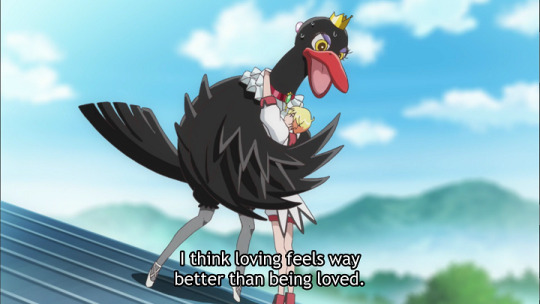
Now I’m starting to see some cleverness on the part of the writers- hear me out below- but first- MORE CUDDLES
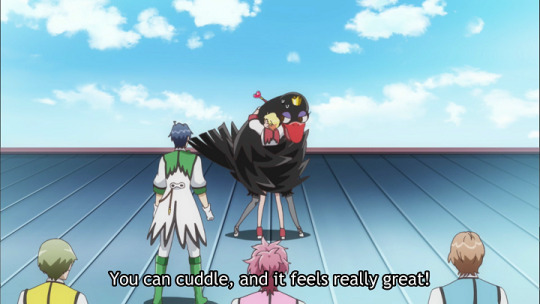

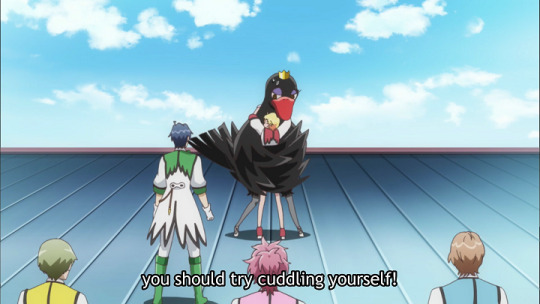


With this, Yumoto can be read several different ways.
On the surface and probably most importantly, regardless of what Yumoto’s personal attraction/orientation is (if he’s even figured it out at this point), he knows love at its purest form. He loves his brother. He loves his senpais (even though at this point they barely know each other- Yumoto probably latches on quickly). But more importantly, he is so in tune with his own feelings he realizes that self love is at the core of any type of love. That if you aren’t secure in yourself, if you don’t care about yourself on some level, how can anyone else care about you either?
This is another reason why I love Yumoto even though he can get a bit heavy-handed at times and seem like a one-note character; HE ISN’T.
Yumoto is incredibly introspective and even though his senapis make comments about how he just kind of shoves everything together to fit the situation he really does understand the monster-ified characters’ insecurities.
(Which can lead to some sad headcanons about how Yumoto has probably felt all of these things at one point or another... oh no...)
But back to my over-analysis of Yumoto’s orientation- with this... it’s really up to interpretation.
He can be read as a young character who hasn’t figured things out yet, he can be read as interested in romantic relationships of any variety but not necessarily anything else, he can be read as only interested in platonic relationships- anything. And while the inconsistency in his portrayal can be a bit maddening- it’s GREAT headcanon opportunity.
Thus, unless s3 gives Yumoto a canon interest- he’s whatever you think he is. Which is AWESOME! DO YOU SEE WHY I LOVE THIS SMOL CINNAMON ROLL?
Aaaand some closing, not very deep thoughts to wrap up-

SO BLUSHY. MUCH ANGELIC. WOW.
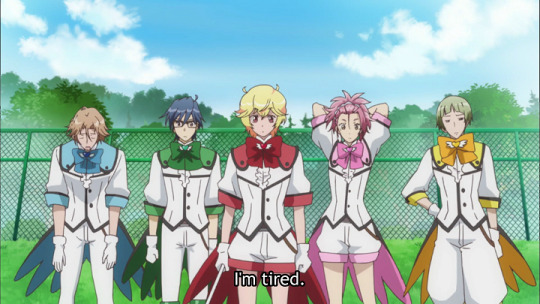
En you’re always tired

Kinchan... why do you want people to grovel at your feet...?

That’s certainly a random question, En- but for shits and giggles; these are their responses if I’m hearing their voices right:
Atsushi - My neck, I guess?
Yumoto - My arms
Ryuu - Armpits
Io - The nape of the neck.
My brain hurts so I have NO idea what these could mean but I highly doubt they’re throwaway lines- SO YOU GUYS TELL ME. Over-analyze what parts they wash first LOL
OKAY WOW THAT WAS LONG AS FUCK AND I GOT TOO DEEP. Again, let me know if I fucked anything up or need to add tags~ And let me know what you think/what your headcanons are/if there’s something from another canon source that could add to this!
I’ll try to get ep 4 up today as well since it took me forever to get back to this but this shit takes longer than I thought. I watch the ep first and take notes, then go back and re-watch and screencap and take more notes, then copy/pasta everything into tumblr and add more thoughts and make it readable. Shew.
#cupkayke rewatches boueibu#cupkaykey rewatches boueibu#boueibu#boueibu meta#binan koukou chikyuu bouei bu love!#binan kōkō chikyū bōei bu love!#binan high school earth defense club love!#Binan Koukou Chikyuu Bouei-bu LOVE!#Cute High Earth Defense Club Love!#tw: pedophila mention#kinda?#sexuality discussion
40 notes
·
View notes
Text
Who you gonna call? Crowdsources.
In times of emergencies and crisis, a fundamental issue that operates alongside the crisis is our ability to communicate and have access to timely and accurate information. With the rise in the capabilities in Web 2.0 and our continual and ever-rising use of social media sites, we have as noted previously seen rises in citizen journalism as well as the crowdsourcing of information and social mapping.
In discussions with Ping Lo, The ABC’s national social media coordinator during the both the 2009 Black Saturday Bushfires and 2011 Queensland floods she discusses the challenges of balancing providing both timely and relevant information to their social media followers.
“It became evident to the broader organisation that employing well-organised social media could have a profound impact in an emergency situation.” (Lo, 2012)
Citizen journalism: Where average citizens have become more active in the creation and sharing of user generated content to form information on current affairs.
Crowdsourcing: In this context, crowdsourcing seeks to gather information and data on current events and crisis situations by sourcing it from third parties such as people in real time.
Social Mapping: A way of using data collated from various sources to map locations of events, services and other important information in times of crisis.
I will draw upon my own experience for a moment during Snowstorm Jonas, a blizzard that hit NYC in January of 2016 and battered much of the East Coast. Being an Australian in a snowstorm is the perfect example of a fish out of water; I had never even seen snow before I went to the USA let alone being in the middle of a blizzard. We had both run out of data and could only rely upon Wifi to get accurate and up-to-date information, in the terminal our flight was due to depart there was no free Wifi available! This situation highlighted to me our reliance on technology to get access to information, although the mainstream news gave adequate updates we struggled to find information that was specific to us.

Although I am not comparing what happened to us in NYC to what occurred in Kenya in 2007 but when Ford (2012) discusses mobile (50%) and internet (10%) penetration in Kenya I feel I can comprehend the situation a little more. With no mobile or data services available to us for a period of 16-20 hours and no access to accurate information in this time it felt like a blackout.
Ford’s (2012) concerns on verifying and authenticating information drew a lot of curiosity for me, because, as she discusses if it is up to one person to authenticate and verify information you create another gatekeeping scenario. If people are untrustworthy of mainstream media sources because of the prominence of news selection bias, you run the risk of creating the same kind of disparity towards projects such as Ushahidi.
In Macnamara’s (2013) article he relevantly points out that (full quote posted in previous post) Pierre Levy’s notions of the ‘collective intelligence’ has become an even-footed challenger to the long standing ideal of professional intermediaries or ‘gatekeepers.’ I believe this is because our awareness and opinions of traditional media conglomerates is changing, and when receive real-time updates from either media outlets or the general public they feel more authentic.
Macnamara (2013) also introduces the idea that there is a rise in apomediation, or apomediaries that act as agents to help us bypass the gatekeepers of information. Torrey (2016) explains the term by breaking down the prefix ‘apo’ which is Latin terminology to mean ‘to stand by,’ the apomediary will stand by you and guide you through disseminating information that you seek on the Internet.
I think that inaccurate reporting during live news exists no matter what platform it is delivered by, we have seen evidence of this during the manhunt for the real Boston bombing suspects. It only took a few hours and the power of the internet (namely reddit investigators) to deliver both the incorrect and correct suspects.
Some questions to get you thinking about your own ideas and opinions in the matter…
Do you think the importance of current and up-to-date information trumps the importance of ensuring that the information is authentic or verified? Think of this in an event like the Haiti earthquakes.
Time is everything in times of genuine crisis, but does access to immediate information make us more impatient?
Is apomediation helpful in access to information? Or does it make us less independent on being able to do our own research?

References & Bibliography
'Boston Marathon bombings' 2014, Wikipedia, viewed 10 January 2017, <http://en.wikipedia.org/wiki/Boston_Marathon_bombings>.
Ford, H (2012) 'Crowd Wisdom', Index on Censorship, vol. 41, no. 4, pp. 33-39.
Glance, D (2011) The future of news: crowdsourced and connected, The Conversation, viewed 10 January 2017<https://theconversation.com/the-future-of-news-crowdsourced-and-connected-4276>.
Macnamara, J (2013) Google’s map of North Korea stirs social media passion and tensions, The Conversation, viewed 10 January 2017 <https://theconversation.com/googles-map-of-north-korea-stirs-social-media-passion-and-tensions-11858>.
Madrigal, A (2013) #BostonBombing: The Anatomy of a Misinformation Disaster, The Atlantic, viewed 10 January 2017 <http://www.theatlantic.com/technology/archive/2013/04/-bostonbombing-the-anatomy-of-a-misinformation-disaster/275155/>.
Poblet, M & Casanovas, P (2012) Crowdsourced crisis mapping: how it works and why it matters, The Conversation, viewed 10 January 2016 <https://theconversation.com/crowdsourced-crisis-mapping-how-it-works-and-why-it-matters-7014>
Postetti, J & Lo, P (2012) The Twitterisation of ABCs Emergency & Disaster Communication, Australian Journal of Emergency Management, Vol. 27, no. 1, pp. 34-39
Torrey, T (2016) Apomediation and Apomediary – Definitions: New Model of How we Find Health Information and Understand It, Verywell, viewed 10 January 2017 <https://www.verywell.com/apomediation-definition-2615145>.
#mda2009#misinformation#crowdsource#socialmapping#crowdsourcing#disasterresponse#information#gatekeepers#collective intelligence
11 notes
·
View notes
Text
Trump needs to shut up
What is important is the Captain can go home and die in peace and he activated testing for everyone aboard his ship
I'm quite sure he will have a better life waiting for him on his home planet than Trump or Alex Laughlin.
I don't see what he did to be any different than me nor damaging. I didn't read the Letter yet Trump is an idiot.
Sailors pen letters. That's what they do. Mail feeds their hearts. Sailors are some of our best penmanship of all.
Next Trump is gonna say it's un-Sailor-like to get a tattoo.
...............
Wendy was explaining COVID-19 is not a new mysterious disease and so to help yourself understand to use the words interchangeably.
She did not say for PROFESSIONALS to do so. Only people at home listening to the news being told to us accurately
This video the news was reported inaccurate.
As i posted a video from Dr Vuong the COVID-19 has at least two parts Corona II and what others and he were calling SARS III. And then the disease was explained in Depth
So when yall go on on and on using incorrect terminology and y'all are incorrectly giving us information
What the fuck?
We spent fucking hours writing shit for y'all to fucking understand and use in the news and hospitals
If you're not gonna use it then why the fuck write it? Why the fuck spend OUR time and waste our heart and minds pouring information out to you?
Y'all all need to fix Your shit and do the news correct and fucking read between the lines if you are a PROFESSIONAL.
If you are a PROFESSIONAL you need to REALIZE there is like 10% or less of you in the world. That is how we see it
So whenever we are speaking to COMFORT the mass of Society we are not speaking to PROFESSIONALS.
ABC and David Muir and this particular Instagram account is a sound off account so i can get "bitchy" I knew David Muir as a child. He is a very good person and darling friend and he has other friends from Governor's Island used to be military Coast Guard base in NYC at the tip of Lower Manhattan now a park on the air often. So this is a different kind of news reporting system they do to help me keep y'all straight.
So my point is made and I'm not angry. Im just making a point that we do a lot of work to make sure we are communicating as best as we can as often as we can.
And they are my #1 news source for many reasons.
But i am serious and honest in my reaction to this video. That is how i feel and how i think.
On a personal level I am doing better today but i am not yet ready to deal with alot of words considering my personal life. Mark has written what Alex came in to tell me which was fucking just appalling words. That i can't expand on and would only repeat half of what he said. Which would just appear to be shock value because I just can't....
I know he tried to have an 5 foot alligator eat my daughter. And so i taught his dogs and monkey to eat his drugs. "Apparently the monkey had an overdose and was taken away." The monkey was fine. He just played dead. That is what I saw. But i found someone that was super kind and defensive of me and my daughter and i prayed about it and i talked to the monkey and he played dead and so the ambulance drove him away to a home that was kinder and gentler. He's our planet's a chimp but hes allowed to remain with his owner whom is alien and go to the next planet. Love is Love. And with him the Chimp feels safe and loved. In order to love we must love. Simple as that.
So please do report correctly.
The confusion is that COVID-19 will die peacefully with a slow down breath sometimes slight cough.
Corona Virus will stay to party on Earth another day.
To say a 6 year old boy with cystic fibrosis healed of COVID-19 means we will allow an alien life to stay. This is untrue. He is alien and he carries COVID-19 but he will die and go to his other planet. But not yet. It is unfair to him to put him on a ventilator to die. That child does not deserve torture. So until hospitals get their shit together .....
Bodies Just need to be put into freezer trucks.
Unfortunately i cannot use magic to evaporate. It is part of the recommendations that I was given from the evaluation of the people -- mostly aliens from Earth.
Because the aliens killed the dinosaurs thus the only way the bodies should be disposed of is by dinosaurs eating them fully and intact.
Dinosaurs do understand the difference between humans and alien life. They understand who killed them and why
Unfortunately it is a spin on this story that can be viewed as horrific. Please do not fear
If you can understand so can they.
If a dog can understand certain words like sit. Beg. Roll over.
Then a dinosaur can understand the concept "you are only eating who killed you"
There is video of them eating non-humans and i talked to the dinosaurs and Mark talked to the others.
There's video of my Team training the tigers from the zoo that is leftover from the film on Netflix "Tiger King" so you can see simple conversation is applicable to animal life
So if you do panic and do not understand please do watch the animal training. Much is on the tv live.
Mark says a lot of y'all like me at my house don't have tv service so you don't understand what the DVR is. Trust me i don't even know. So hes pinning the link up
Its free. There's an app. For those that don't have tv service.
Unfortunately moving via teleportation or evaporation will not help dinosaur murderers to understand it was wrong and they will never be allowed to return to Earth. This is not my ruling but recommended to me.
So if you are in the United States send them to Los Lunas New Mexico 87031 and Wyoming National Park for Yogi.
In South America Venezuela.
Africa to Giza and the southern tip.
Scottland and New South Wales.
Mark will edit he knows more.
Please fill the trucks. I know that is disgusting and feels inhumane. Realize they are reincarnated or their planet rulers at one time did not feel it a problem that they killed an entire life breed on our planet.
So it is food. They do not need to be naked. A dinosaur can undress them and often will play with their food like Barbies. In the end "what you want to kill me?!" Gulp gulp gulp.
But it is fascinating they will show their "true skin" via"play"
0 notes
Text
I am very concerned with normalizing bodies, and breasts in particular. Talking about "men's tits" achieves the opposite of that. Objectifying men the way women are objectified is not progressive and is not furthering liberation for anyone. I've seen fandoms discuss who has the best "tits" in a cast, without even specifying men, but only include male characters. Why is that? Because no one cares about women? Because if you talk about a woman's breasts that way it's obviously misogynistic and it exposes what you're really doing? Both? I don't know, but I see it happen all the time. It also has not escaped my notice that the "men's tits" people post about belong to skinny cis men (mostly white), and not to fat men or trans men, the men who actually deal with being described as having "man boobs" in a negative way. I don't like the conflation of breasts with pectoral muscles, which are different body parts with different functions. At the same time that all of this is going on, I still see memes pushing for terms like "chestfeeding" and "chest cancer." "Chest cancer" is indefensible to me because the chest is a region of the body and breast cancer is malignant growth of breast cells that can affect anyone, including cis men who also have breast tissue. It's simply inaccurate and incorrect. "Chestfeeding" I understand and I think it's harmless but I wish in addition to using terminology to make trans parents comfortable we could also work to make the word "breast" gender-neutral because it is! It neither surprises nor pleases me that the sexualized "tits" is allowed to be gender-neutral to some extent while the anatomically correct "breast" is not.
I am opposed to "men's tits" posting in general because I feel it is not progressive in the slightest and in many ways the opposite.
27 notes
·
View notes
Text
Empowering speech, challenges on ‘correctness’ and some questions for sociolinguists.
A couple of years ago I wrote a post called ‘Modelling good speech: Let’s talk properly‘ and, on a whim, I recycled it very recently. It’s very much a ‘from the hip’ kind of blog but, nonetheless, most of the responses I get are positive, including from English teachers. However, there has always been some heavy – even angry – criticism including most recently from various people including sociolinguists like Rob Drummond and commentators like Oliver Kamm from The Times. I have just found this article that pretty much rips my blog apart on a blog for English Language A level students – it captures some of the negative responses: http://ift.tt/2hbIFDR. I tend to filter out the outrage but it’s impossible to be criticised so robustly and not take notice. So, as promised in my twitter exchange with Rob, Oliver and James Durran, here is a follow-up. I have genuine questions.
The context for my original post was working in a very mixed school where the range of speech modes was huge and where the issues of disadvantage and empowerment were evident daily. One example I often think of was hearing a successful academic student with a key leadership role giving a report in assembly after a very special school trip. This was, without question, an occasion for formal speech where a formal speech code would have been appropriate, not least because he was a significant role-model. Through-out his speech he used ‘done’: “We done a trek; we done a trip to the market; we done a presentation”. He was an EAL student having arrived from another country some 10 years before but my instinct was that, since he had been in that school for six years, we should have done a better job in teaching him the formal speech code that would have led him to say ‘we went on a trek; we gave a presentation’ and so on.
My sense is that, without that fluency and self-awareness, this student will be undermined and undeservedly disempowered in the real world where formal speech carries significant value. Is that wrong? It was also my strong feeling that a major reason this student had not yet fully mastered appropriate formal speech was that, throughout his time in the school, teachers had been reluctant to address the issue on a day to day basis for fear of being insensitive or denigrating his default speech mode. I discussed it with him explicitly – because he had interviews to prepare for. He saw it as a failing of his education that he hadn’t been taught to ‘speak well’ – as he put it – even when he wanted to and he was concerned that the habits were now hard to break.
Another context is that the Speaking and Listening component of English GCSE, while it remained, had yielded startlingly good results, catapulting the school into the top 5% of value-adding schools for English GCSE overall. Did this match their actual confidence with speaking in general or their underlying skills with English language? No. It was an illusion generated by intensive scripted rehearsal with serious consequences – because there had been no emphasis on building authentic confidence with formal speech.
In response, we introduced a wide-reaching oracy programme to address the issue with structured speech activities across the curriculum. Project Soapbox – giving every KS3 child an opportunity to make a public speech – and poetry recitations were becoming a feature of school life alongside more regular opportunities for debates, presentations and student-led teaching episodes. More simply, we were trying to develop a culture were students gave more extended verbal answers in class and, yes, where certain common ungrammatical phrases were challenged/redirected/corrected.
This has nothing to do with dialects or accents. I used to work in Wigan where accents were so localised that, even as a Southerner, after three years I could tell if someone came from Leigh, Wigan, Skelmersdale or St Helens. It was part of everyday chatter that accents and phrases were discussed. My own use of English was a constant source of banter with students. Some students would use phrases like ‘ave for t’ go for t’ get bus’ (affott go fott get bus). That’s the kind of linguist diversity that we should all embrace. But those students could also say ‘I have to catch a bus’ if they needed to; if they chose to. My use of ‘properly’ is only meant in reference to that context when students simply make mistakes in relation to a formal code that they themselves are seeking to use.
However, as a result of this debate, I understand that it is important to be very clear about context and terminology and I regret the rather flippant approach taken in my original post. It was meant as a provocation but that now seems inappropriate and certainly open to misinterpretation of the intentions. If there is a bit of an us/them element, the ‘us’ is anyone who is fluent in using formal English appropriate to any formal setting whenever they wish; the ‘them’ is anyone disempowered by not having full access to that code. My intentions are good – despite the dismay and disapproval my post generated for some.
I am keen to understand how we can move forward with this vitally important agenda whilst also taking account of sociolinguistic factors.
I wonder if we could all agree on some things:
Language is constantly changing so any sense of ‘correctness’ could only ever be temporary in a very specific context and, as such, is problematic.
There are multiple forms of language that make up what we call English, each of which has value; the relative value placed on any one code is arbitrary and driven by social factors, snobbishness and so on.
The speech of those in positions of power should not, on principle, dictate what is correct or proper for everyone in their everyday speech. ‘Correct’ and ‘proper’ have no value at all as terms for language in general.
At any given time, de facto, there is a widely accepted formal speech code that can be defined through common grammatical rules and vocabulary albeit with wide- ranging, constantly evolving alternatives. This code is aligned to written Standard English and the common speech mode of those in powerful privileged positions and, as such, is, de facto, empowering, whether we like it or not. It is important for children and adults to have access to this speech code and to be able to use it in the appropriate context – or at least have the capacity to choose to use it.
We are never talking about or privileging certain accents: formal speech, however it is defined, can be and is spoken in any accent.
In order to have a discussion about speech amongst a group of educators or with our students, it is useful to have some terminology we can use to describe a situation where one form of speech might not be appropriate – i.e. where, as a teacher, you might suggest that your student says something in a different way. I find it hard not to say ‘incorrect’ – but I understand why people might object. Do we ever say speech is inaccurate, incorrect, ungrammatical, inappropriate? Is language really that fluid? Do we always have to add the tagline, ‘in this particular context’. Can we not agree that, if we are talking specifically about teaching students to use the prevailing formal speech code, then some structures are ‘correct’ in the context of that code – or is ‘ungrammatical’ better as I’ve seen Oliver suggest? Or is ‘inappropriate’ always the best term?
Let’s use some specifics – avoiding my flippant pet-peeves, which, I readily acknowledge, simply reveal my prejudices and snobberies. I’m also avoiding phrases that might be associated with friends chatting. I’ve never said anything to suggest that we’re trying to mandate how people speak to each other outside a formal speech context. These are all things I’ve heard said in school/classroom context:
We done an experiment.
We was writing a story.
How much people was there?
What was you saying about it?
She done excellent in that performance.
Is nothing in speech ever wrong? Is it never wrong in a school classroom context? Or is it simply inappropriate? Do I, as a teacher, have the right to determine that, in my classroom, we use formal speech codes and set some parameters for appropriateness? Or, does a school – supported by a Headteacher or school policy – have the right to assert that, in all our educational interactions, we use formal speech codes? If so, what do we do and say when students use other codes – or simply make mistakes when trying to use the formal code, assuming we can tell the difference?
If we agree that we want to empower all our students with the ability to use formal speech when they choose to, isn’t it much harder to achieve in practice if we are often inhibited by the need to be sensitive to and give value to linguistic variations at the same time? Isn’t it easier to say that, at school, this is how we all speak? Why? Because, in life, it will empower you and we need to give you as much practice as possible.
This is especially difficult to manage when we have learners of different kinds to cater for:
First language English speakers simply improving their vocabulary and fluency but living in a world dominated by formal spoken English
First language English speakers who routinely use a different code in their home life and peer group associated with their family/social origins
First language English speakers who switch codes routinely between home and school and peer group but predominantly use a local speech code with wide ranging alternative uses of grammar and vocabulary, independent of social background
ESOL/EAL speakers who are new to the country and want to learn formal English or to match the form of language they use in their native language.
2nd generation EAL speakers who predominantly speak in English learned from other EAL speakers in their peer group and at home.
If I’m learning to speak more fluently, simply as a first language speaker, I’d hope my teachers would give me appropriate direction. However, what if they find it hard to challenge my ‘errors’ (if that’s what they are?) but not those of other members in the class where they are not short-term errors but routine parts of their everyday speech? Or is this just down to my parents and off-limits to teachers unless, very literally, I am giving a speech?
If I learn French, I don’t want to learn the equivalent of ‘we done an experiment’ or ‘she done excellent’. I don’t want to be told that is fine – except in a formal context. I want to learn a grammatically accurate form I can use anywhere. This was the point of me citing the David Sedaris story from ‘Me talk pretty some day’ in my blog. ‘He nice, the Jesus‘ is funny. It makes light of the challenge of language learning – it’s good comic material. There’s always a sense that learning a language is aimed at a particular form of it in the main, especially at the early stages. That’s sensible enough isn’t it? If that is right for me learning French, why isn’t it right for an EAL student? For them, isn’t it more helpful if, at all times during the school day, they are being directed towards a certain speech code if they simply want to learn to speak formal English as well as they can?
If my son said something like ‘I’m going shops now, innit’, as his parent, I would challenge him on that. Is that not my responsibility as a parent to guide my child’s speech? Is there a line between ‘teaching to speak’ and ‘teaching to speak well’? Would any of the sociolinguists I’ve angered handle this differently? Is there a line where language becomes slang or falls below a standard that is appropriate even at home? Who decides? And is it right that I have a different set of rules for my children compared to my students – if we share the goal that all of them must conquer the challenge of using formal spoken English with fluency and confidence? I worry a lot that we’re simply fuelling a divide here. Formal language for some but not for all? I’m ok, my kids are ok but you don’t need what we have? To me, that really is patronising and disempowering.
If your answer is but of course we also teach formal language my questions are about the practicalities. It’s quite a subtle message to give consistently that ‘it’s not wrong, it’s just inappropriate’ and I can imagine that slipping quite often even if the intent is there amongst teachers working with the best intentions. Surely that’s less of a problem than saying nothing and accepting any form of speech you hear – even when your instinct is that it’s inappropriate for the context?
My overriding sense is that, given the complexities of teaching a diverse group of students, it is legitimate and pragmatic to assert that, whilst recognising diversity in all manner of ways, we want all students to learn to use formal speech codes and that, therefore, a school needs to focus on it and reinforce it in every in-school context. I accept that calling this ‘speaking properly’ is unhelpful if the wider diversity message isn’t also strong. However, we have to be realistic about the pace of social change. It might be important to challenge the power structures around dominant language codes and to champion greater diversity and confidence with multiple speech codes – but that’s the long game. An academic debate about sociolinguistics and the injustice of language snobbery is no use to a student wrestling with formal English if, as a result of institutionalised awkwardness, they never master it – and meanwhile, the students down the road are walking tall because they can switch codes with ease with all the advantages that brings.
I hope that’s a helpful contribution. More questions than answers.
Empowering speech, challenges on ‘correctness’ and some questions for sociolinguists. published first on http://ift.tt/2uVElOo
0 notes
Photo

11 Common Analytics Pitfalls to Watch Out For
The following is a short extract from our book, Researching UX: Analytics, written by Luke Hay. It's the ultimate guide to using analytics for improved user experience. SitePoint Premium members get access with their membership, or you can buy a copy in stores worldwide.
When you first start analyzing data, it’s easy to make mistakes, particularly if you’re new to analytics. Don’t let that put you off, though! This section lists some of the main pitfalls, and how they’re best avoided—to ensure your analysis paints a true picture of user behavior.
Confusing Visits and Views
Different analytics tools will use different terminology to describe the same thing. For rookie analysts, this can cause confusion, and can mean that the wrong data is reported. Even within the same tool, terminology can be confusing. One of the most common mistakes people make is to confuse visits and views.
A visit (now known as a session in Google Analytics) generally describes a group of interactions one user takes within a given time frame on your website. A view (or “pageview” in some tools) describes a view of a page on your site that is tracked by the analytics tracking code.
These are two entirely different things, but visits and views are sometimes used interchangeably when people talk about their analytics. As you can imagine, this can cause problems for analysts, as reports will become inaccurate. Make sure you understand the terminology, so that you know what you’re reporting on. (See the Google Analytics glossary at the end of this book if you’re unsure.)
Obsessing over Visits and Views
When it comes to analyzing your data, you need to make sure you’re analyzing the most important areas. A very common mistake people make is to focus purely on visits and views. Because you’re a UXer, I know I don’t need to convince you that there’s more to a website than just a lot of people visiting it! You may still find yourself under pressure, though, to increase page views or even visits. Leave this side of things to marketers, and focus your efforts on the numbers that relate to user experience.
Getting Drawn into the Numbers
Quantitative data is all about numbers. If your account is set up correctly, the numbers don’t lie! Despite this, you need to make sure you don’t forget what the numbers actually represent: real users.
As stated previously, the numbers will tell you what happened, not why, and this is why it’s important not to forget to ask why. You’ll need to look beyond the numbers and consider their context. Make sure you don’t fall into the trap of just reporting what has happened: be sure to consider the bigger picture and think about what the numbers mean for the user experience of your website.
This is where you’ll need to bring in the qualitative methods we touched on previously. You can often use analytics to find a problem, and user research methods to solve it.
Thinking Low Numbers Are Always Bad
One side effect of getting drawn into the numbers is that you automatically consider low numbers, or a drop in numbers, to be bad. While a drop in purchases is likely to be a bad thing, a reduction in the time users spend on particular pages, for example, could be good or bad.
If you’ve redesigned the home page on a website and the time people are spending on it drops, this could be due to the improved efficiency of your design. It may be that people are able to navigate more quickly to areas of interest to them. Once again, context is key here. Work out what any drops actually mean for the website as a whole, rather than assuming they’re always going to be negative.
Confusing Correlation with Causation
Just because something happens to your analytics at the same time as you make a change to the website doesn’t mean the two are connected. If you notice changes to your analytics after making a change, you need to be sure it’s not a coincidence and that the two are connected.
You’re likely to have to delve a little deeper into your reports to prove that the rise in conversion rate was due to your great new design. This is covered in more detail in Chapter 6, but it’s something you should be aware of before you take credit (or blame!) for any sizable shifts in your reporting data.
The graph below, taken from tylervigen.com, shows a correlation of close to 95% for cheese consumption and number of people who died by becoming tangled in their bed sheets:
There’s also a strong correlation between ice cream sales and drownings at sea, as both go up in the summer. Only an analyst severely lacking common sense would say that ice cream causes drowning, though!
The correlation versus causation issue is probably the most prolific mistake I see people make when analyzing data. When it comes to website analytics, one example of this might be where data shows that people who use site search covert 50% more than those who don’t. This could convince UXers to encourage more people to use the site search. However, the more likely correlation is that people who use the site search are a more engaged audience than the average users, and also have a better idea of what they’re looking for—meaning that they naturally have higher conversion rates.
Combining quant and qual (and sometimes your own common sense) will help ensure you don’t fall into the trap of confusing correlation and causation. Split testing is also a great way to determine true causation, and will help to protect against drawing incorrect conclusions from your data. We’ll cover split testing more in Chapter 6.
Grouping All Visits Together
As UXers, we know that different people use websites in different ways. We also know that the same person is likely to use a website differently when using different devices, or even using the same website at different times of the day. We need to include these considerations of user behavior in our quantitative analysis.
Continue reading %11 Common Analytics Pitfalls to Watch Out For%
by Luke Hay via SitePoint http://ift.tt/2yJYIAi
0 notes
Text
Empowering speech, challenges on ‘correctness’ and some questions for sociolinguists.
A couple of years ago I wrote a post called ‘Modelling good speech: Let’s talk properly‘ and, on a whim, I recycled it very recently. It’s very much a ‘from the hip’ kind of blog but, nonetheless, most of the responses I get are positive, including from English teachers. However, there has always been some heavy – even angry – criticism including most recently from various people including sociolinguists like Rob Drummond and commentators like Oliver Kamm from The Times. I have just found this article that pretty much rips my blog apart on a blog for English Language A level students – it captures some of the negative responses: http://ift.tt/2hbIFDR. I tend to filter out the outrage but it’s impossible to be criticised so robustly and not take notice. So, as promised in my twitter exchange with Rob, Oliver and James Durran, here is a follow-up. I have genuine questions.
The context for my original post was working in a very mixed school where the range of speech modes was huge and where the issues of disadvantage and empowerment were evident daily. One example I often think of was hearing a successful academic student with a key leadership role giving a report in assembly after a very special school trip. This was, without question, an occasion for formal speech where a formal speech code would have been appropriate, not least because he was a significant role-model. Through-out his speech he used ‘done’: “We done a trek; we done a trip to the market; we done a presentation”. He was an EAL student having arrived from another country some 10 years before but my instinct was that, since he had been in that school for six years, we should have done a better job in teaching him the formal speech code that would have led him to say ‘we went on a trek; we gave a presentation’ and so on.
My sense is that, without that fluency and self-awareness, this student will be undermined and undeservedly disempowered in the real world where formal speech carries significant value. Is that wrong? It was also my strong feeling that a major reason this student had not yet fully mastered appropriate formal speech was that, throughout his time in the school, teachers had been reluctant to address the issue on a day to day basis for fear of being insensitive or denigrating his default speech mode. I discussed it with him explicitly – because he had interviews to prepare for. He saw it as a failing of his education that he hadn’t been taught to ‘speak well’ – as he put it – even when he wanted to and he was concerned that the habits were now hard to break.
Another context is that the Speaking and Listening component of English GCSE, while it remained, had yielded startlingly good results, catapulting the school into the top 5% of value-adding schools for English GCSE overall. Did this match their actual confidence with speaking in general or their underlying skills with English language? No. It was an illusion generated by intensive scripted rehearsal with serious consequences – because there had been no emphasis on building authentic confidence with formal speech.
In response, we introduced a wide-reaching oracy programme to address the issue with structured speech activities across the curriculum. Project Soapbox – giving every KS3 child an opportunity to make a public speech – and poetry recitations were becoming a feature of school life alongside more regular opportunities for debates, presentations and student-led teaching episodes. More simply, we were trying to develop a culture were students gave more extended verbal answers in class and, yes, where certain common ungrammatical phrases were challenged/redirected/corrected.
This has nothing to do with dialects or accents. I used to work in Wigan where accents were so localised that, even as a Southerner, after three years I could tell if someone came from Leigh, Wigan, Skelmersdale or St Helens. It was part of everyday chatter that accents and phrases were discussed. My own use of English was a constant source of banter with students. Some students would use phrases like ‘ave for t’ go for t’ get bus’ (affott go fott get bus). That’s the kind of linguist diversity that we should all embrace. But those students could also say ‘I have to catch a bus’ if they needed to; if they chose to. My use of ‘properly’ is only meant in reference to that context when students simply make mistakes in relation to a formal code that they themselves are seeking to use.
However, as a result of this debate, I understand that it is important to be very clear about context and terminology and I regret the rather flippant approach taken in my original post. It was meant as a provocation but that now seems inappropriate and certainly open to misinterpretation of the intentions. If there is a bit of an us/them element, the ‘us’ is anyone who is fluent in using formal English appropriate to any formal setting whenever they wish; the ‘them’ is anyone disempowered by not having full access to that code. My intentions are good – despite the dismay and disapproval my post generated for some.
I am keen to understand how we can move forward with this vitally important agenda whilst also taking account of sociolinguistic factors.
I wonder if we could all agree on some things:
Language is constantly changing so any sense of ‘correctness’ could only ever be temporary in a very specific context and, as such, is problematic.
There are multiple forms of language that make up what we call English, each of which has value; the relative value placed on any one code is arbitrary and driven by social factors, snobbishness and so on.
The speech of those in positions of power should not, on principle, dictate what is correct or proper for everyone in their everyday speech. ‘Correct’ and ‘proper’ have no value at all as terms for language in general.
At any given time, de facto, there is a widely accepted formal speech code that can be defined through common grammatical rules and vocabulary albeit with wide- ranging, constantly evolving alternatives. This code is aligned to written Standard English and the common speech mode of those in powerful privileged positions and, as such, is, de facto, empowering, whether we like it or not. It is important for children and adults to have access to this speech code and to be able to use it in the appropriate context – or at least have the capacity to choose to use it.
We are never talking about or privileging certain accents: formal speech, however it is defined, can be and is spoken in any accent.
In order to have a discussion about speech amongst a group of educators or with our students, it is useful to have some terminology we can use to describe a situation where one form of speech might not be appropriate – i.e. where, as a teacher, you might suggest that your student says something in a different way. I find it hard not to say ‘incorrect’ – but I understand why people might object. Do we ever say speech is inaccurate, incorrect, ungrammatical, inappropriate? Is language really that fluid? Do we always have to add the tagline, ‘in this particular context’. Can we not agree that, if we are talking specifically about teaching students to use the prevailing formal speech code, then some structures are ‘correct’ in the context of that code – or is ‘ungrammatical’ better as I’ve seen Oliver suggest? Or is ‘inappropriate’ always the best term?
Let’s use some specifics – avoiding my flippant pet-peeves, which, I readily acknowledge, simply reveal my prejudices and snobberies. I’m also avoiding phrases that might be associated with friends chatting. I’ve never said anything to suggest that we’re trying to mandate how people speak to each other outside a formal speech context. These are all things I’ve heard said in school/classroom context:
We done an experiment.
We was writing a story.
How much people was there?
What was you saying about it?
She done excellent in that performance.
Is nothing in speech ever wrong? Is it never wrong in a school classroom context? Or is it simply inappropriate? Do I, as a teacher, have the right to determine that, in my classroom, we use formal speech codes and set some parameters for appropriateness? Or, does a school – supported by a Headteacher or school policy – have the right to assert that, in all our educational interactions, we use formal speech codes? If so, what do we do and say when students use other codes – or simply make mistakes when trying to use the formal code, assuming we can tell the difference?
If we agree that we want to empower all our students with the ability to use formal speech when they choose to, isn’t it much harder to achieve in practice if we are often inhibited by the need to be sensitive to and give value to linguistic variations at the same time? Isn’t it easier to say that, at school, this is how we all speak? Why? Because, in life, it will empower you and we need to give you as much practice as possible.
This is especially difficult to manage when we have learners of different kinds to cater for:
First language English speakers simply improving their vocabulary and fluency but living in a world dominated by formal spoken English
First language English speakers who routinely use a different code in their home life and peer group associated with their family/social origins
First language English speakers who switch codes routinely between home and school and peer group but predominantly use a local speech code with wide ranging alternative uses of grammar and vocabulary, independent of social background
ESOL/EAL speakers who are new to the country and want to learn formal English or to match the form of language they use in their native language.
2nd generation EAL speakers who predominantly speak in English learned from other EAL speakers in their peer group and at home.
If I’m learning to speak more fluently, simply as a first language speaker, I’d hope my teachers would give me appropriate direction. However, what if they find it hard to challenge my ‘errors’ (if that’s what they are?) but not those of other members in the class where they are not short-term errors but routine parts of their everyday speech? Or is this just down to my parents and off-limits to teachers unless, very literally, I am giving a speech?
If I learn French, I don’t want to learn the equivalent of ‘we done an experiment’ or ‘she done excellent’. I don’t want to be told that is fine – except in a formal context. I want to learn a grammatically accurate form I can use anywhere. This was the point of me citing the David Sedaris story from ‘Me talk pretty some day’ in my blog. ‘He nice, the Jesus‘ is funny. It makes light of the challenge of language learning – it’s good comic material. There’s always a sense that learning a language is aimed at a particular form of it in the main, especially at the early stages. That’s sensible enough isn’t it? If that is right for me learning French, why isn’t it right for an EAL student? For them, isn’t it more helpful if, at all times during the school day, they are being directed towards a certain speech code if they simply want to learn to speak formal English as well as they can?
If my son said something like ‘I’m going shops now, innit’, as his parent, I would challenge him on that. Is that not my responsibility as a parent to guide my child’s speech? Is there a line between ‘teaching to speak’ and ‘teaching to speak well’? Would any of the sociolinguists I’ve angered handle this differently? Is there a line where language becomes slang or falls below a standard that is appropriate even at home? Who decides? And is it right that I have a different set of rules for my children compared to my students – if we share the goal that all of them must conquer the challenge of using formal spoken English with fluency and confidence? I worry a lot that we’re simply fuelling a divide here. Formal language for some but not for all? I’m ok, my kids are ok but you don’t need what we have? To me, that really is patronising and disempowering.
If your answer is but of course we also teach formal language my questions are about the practicalities. It’s quite a subtle message to give consistently that ‘it’s not wrong, it’s just inappropriate’ and I can imagine that slipping quite often even if the intent is there amongst teachers working with the best intentions. Surely that’s less of a problem than saying nothing and accepting any form of speech you hear – even when your instinct is that it’s inappropriate for the context?
My overriding sense is that, given the complexities of teaching a diverse group of students, it is legitimate and pragmatic to assert that, whilst recognising diversity in all manner of ways, we want all students to learn to use formal speech codes and that, therefore, a school needs to focus on it and reinforce it in every in-school context. I accept that calling this ‘speaking properly’ is unhelpful if the wider diversity message isn’t also strong. However, we have to be realistic about the pace of social change. It might be important to challenge the power structures around dominant language codes and to champion greater diversity and confidence with multiple speech codes – but that’s the long game. An academic debate about sociolinguistics and the injustice of language snobbery is no use to a student wrestling with formal English if, as a result of institutionalised awkwardness, they never master it – and meanwhile, the students down the road are walking tall because they can switch codes with ease with all the advantages that brings.
I hope that’s a helpful contribution. More questions than answers.
Empowering speech, challenges on ‘correctness’ and some questions for sociolinguists. published first on http://ift.tt/2uVElOo
0 notes
Text
Empowering speech, challenges on ‘correctness’ and some questions for sociolinguists.
A couple of years ago I wrote a post called ‘Modelling good speech: Let’s talk properly‘ and, on a whim, I recycled it very recently. It’s very much a ‘from the hip’ kind of blog but, nonetheless, most of the responses I get are positive, including from English teachers. However, there has always been some heavy – even angry – criticism including most recently from various people including sociolinguists like Rob Drummond and commentators like Oliver Kamm from The Times. I have just found this article that pretty much rips my blog apart on a blog for English Language A level students – it captures some of the negative responses: http://ift.tt/2hbIFDR. I tend to filter out the outrage but it’s impossible to be criticised so robustly and not take notice. So, as promised in my twitter exchange with Rob, Oliver and James Durran, here is a follow-up. I have genuine questions.
The context for my original post was working in a very mixed school where the range of speech modes was huge and where the issues of disadvantage and empowerment were evident daily. One example I often think of was hearing a successful academic student with a key leadership role giving a report in assembly after a very special school trip. This was, without question, an occasion for formal speech where a formal speech code would have been appropriate, not least because he was a significant role-model. Though-out his speech he used ‘done’: “We done a trek; we done a trip to the market; we done a presentation”. He was an EAL student having arrived from another country some 10 years before but my instinct was that, since he had been in that school for six years, we should have done a better job in teaching him the formal speech code that would have led him to say ‘we went on a trek; we gave a presentation’ and so on.
My sense is that, without that fluency and self-awareness, this student will be undermined and undeservedly disempowered in the real world where formal speech carries significant value. Is that wrong? It was also my strong feeling that a major reason this student had not yet fully mastered appropriate formal speech was that, throughout his time in the school, teachers has been reluctant to address the issue on a day to day basis for fear of being insensitive or denigrating his default speech mode. I discussed it with him explicitly – because he had interviews to prepare for. He saw it as a failing of his education that he hadn’t been taught to ‘speak well’ – as he put it – even when he wanted to and he was concerned that the habits were now hard to break.
Another context is that the Speaking and Listening component of English GCSE, while it remained, had yielded startlingly good results, catapulting the school into the top 5% of value-adding schools for English GCSE overall. Did this match their actual confidence with speaking in general or their underlying skills with English language? No. It was an illusion generated by intensive scripted rehearsal with serious consequences – because there had been no emphasis on building authentic confidence with formal speech.
In response, we introduced a wide-reaching oracy programme to address the issue with structured speech activities across the curriculum. Project Soapbox – giving every KS3 child an opportunity to make a public speech – and poetry recitations were becoming a feature of school life alongside more regular opportunities for debates, presentations and student-led teaching episodes. More simply, we were trying to develop a culture were students gave more extended verbal answers in class and, yes, where certain common ungrammatical phrases were challenged/redirected/corrected.
This has nothing to do with dialects or accents. I used to work in Wigan where accents were so localised that, even as a Southerner, after three years I could tell if someone came from Leigh, Wigan, Skelmersdale or St Helens. It was part of everyday chatter that accents and phrases were discussed. My own use of English was a constant source of banter with students. Some students would use phrases like ‘ave for t’ go for t’ get bus’ (affott go fott get bus). That’s the kind of linguist diversity that we should all embrace. But those students could also say ‘I have to catch a bus’ if they needed to; if they chose to. My use of ‘properly’ is only meant in reference to that context when students simply make mistakes in relation to a formal code that they themselves are seeking to use.
However, as a result of this debate, I understand that it is important to be very clear about context and terminology and I regret the rather flippant approach taken in my original post. It was meant as a provocation but that now seems inappropriate and certainly open to misinterpretation of the intentions. If there is a bit of an us/them element, the ‘us’ is anyone who is fluent in using formal English appropriate to any formal setting whenever they wish; the ‘them’ is anyone disempowered by not having full access to that code. My intentions are good – despite the dismay and disapproval my post generated for some.
I am keen to understand how we can move forward with this vitally important agenda whilst also taking account of sociolinguistic factors.
I wonder if we could all agree on some things:
Language is constantly changing so any sense of ‘correctness’ could only ever be temporary in a very specific context and, as such, is problematic.
There are multiple forms of language that make up what we call English, each of which has value; the relative value placed on any one code is arbitrary and driven by social factors, snobbishness and so on.
The speech of those in positions of power should not, on principle, dictate what is correct or proper for everyone in their everyday speech. ‘Correct’ and ‘proper’ have no value at all as terms for language in general.
At any given time, de facto, there is a widely accepted formal speech code that can be defined through common grammatical rules and vocabulary albeit with wide- ranging, constantly evolving alternatives. This code is aligned to written Standard English and the common speech mode of those in powerful privileged positions and, as such, is, de facto, empowering, whether we like it or not. It is important for children and adults to have access to this speech code and to be able to use it in the appropriate context – or at least have the capacity to choose to use it.
We are never talking about or privileging certain accents: formal speech, however it is defined, can be and is spoken in any accent.
In order to have a discussion about speech amongst a group of educators or with our students, it is useful to have some terminology we can use to describe a situation where one form of speech might not be appropriate – i.e. where, as a teacher, you might suggest that your student says something in a different way. I find it hard not to say ‘incorrect’ – but I understand why people might object. Do we ever say speech is inaccurate, incorrect, ungrammatical, inappropriate? Is language really that fluid? Do we always have to add the tagline, ‘in this particular context’. Can we not agree that, if we are talking specifically about teaching students to use the prevailing formal speech code, then some structures are ‘correct’ in the context of that code – or is ‘ungrammatical’ better as I’ve seen Oliver suggest? Or is ‘inappropriate’ always the best term?
Let’s use some specifics – avoiding my flippant pet-peeves, which, I readily acknowledge, simply reveal my prejudices and snobberies. I’m also avoiding phrases that might be associated with friends chatting. I’ve never said anything to suggest that we’re trying to mandate how people speak to each other outside a formal speech context. These are all things I’ve heard said in school/classroom context:
We done an experiment.
We was writing a story.
How much people was there?
What was you saying about it?
She done excellent in that performance.
Is nothing in speech ever wrong? Is it never wrong in a school classroom context? Or is it simply inappropriate? Do I, as a teacher, have the right to determine that, in my classroom, we use formal speech codes and set some parameters for appropriateness? Or, does a school – supported by a Headteacher or school policy – have the right to assert that, in all our educational interactions, we use formal speech codes? If so, what do we do and say when students use other codes – or simply make mistakes when trying to use the formal code, assuming we can tell the difference?
If we agree that we want to empower all our students with the ability to use formal speech when they choose to, isn’t it much harder to achieve in practice if we are often inhibited by the need to be sensitive to and give value to linguistic variations at the same time? Isn’t it easier to say that, at school, this is how we all speak? Why? Because, in life, it will empower you and we need to give you as much practice as possible.
This is especially difficult to manage when we have learners of different kinds to cater for:
First language English speakers simply improving their vocabulary and fluency but living in a world dominated by formal spoken English
First language English speakers who routinely use a different code in their home life and peer group associated with their family/social origins
First language English speakers who switch codes routinely between home and school and peer group but predominantly use a local speech code with wide ranging alternative uses of grammar and vocabulary, independent of social background
ESOL/EAL speakers who are new to the country and want to learn formal English or to match the form of language they use in their native language.
2nd generation EAL speakers who predominantly speak in English learned from other EAL speakers in their peer group and at home.
If I’m learning to speak more fluently, simply as a first language speaker, I’d hope my teachers would give me appropriate direction. However, what if they find it hard to challenge my ‘errors’ (if that’s what they are?) but not those of other members in the class where they are not short-term errors but routine parts of their everyday speech? Or is this just down to my parents and off-limits to teachers unless, very literally, I am giving a speech?
If I learn French, I don’t want to learn the equivalent of ‘we done an experiment’ or ‘she done excellent’. I don’t want to be told that is fine – except in a formal context. I want to learn a grammatically accurate form I can use anywhere. This was the point of me citing the David Sedaris story from ‘Me talk pretty some day’ in my blog. ‘He nice, the Jesus‘ is funny. It makes light of the challenge of language learning – it’s good comic material. There’s always a sense that learning a language is aimed at a particular form of it in the main, especially at the early stages. That’s sensible enough isn’t it? If that is right for me learning French, why isn’t it right for an EAL student? For them, isn’t it more helpful if, at all times during the school day, they are being directed towards a certain speech code if they simply want to learn to speak formal English as well as they can?
If my son said something like ‘I’m going shops now, innit’, as his parent, I would challenge him on that. Is that not my responsibility as a parent to guide my child’s speech? Is there a line between ‘teaching to speak’ and ‘teaching to speak well’? Would any of the sociolinguists I’ve angered handle this differently? Is there a line where language becomes slang or falls below a standard that is appropriate even at home? Who decides? And is it right that I have a different set of rules for my children compared to my students – if we share the goal that all of them must conquer the challenge of using formal spoken English with fluency and confidence? I worry a lot that we’re simply fuelling a divide here. Formal language for some but not for all? I’m ok, my kids are ok but you don’t need what we have? To me, that really is patronising and disempowering.
If your answer is but of course we also teach formal language my questions are about the practicalities. It’s quite a subtle message to give consistently that ‘it’s not wrong, it’s just inappropriate’ and I can imagine that slipping quite often even if the intent is there amongst teachers working with the best intentions. Surely that’s less of a problem than saying nothing and accepting any form of speech you hear – even when your instinct is that it’s inappropriate for the context?
My overriding sense is that, given the complexities of teaching a diverse group of students, it is legitimate and pragmatic to assert that, whilst recognising diversity in all manner of ways, we want all students to learn to use formal speech codes and that, therefore, a school needs to focus on it and reinforce it in every in-school context. I accept that calling this ‘speaking properly’ is unhelpful if the wider diversity message isn’t also strong. However, we have to be realistic about the pace of social change. It might be important to challenge the power structures around dominant language codes and to champion greater diversity and confidence with multiple speech codes – but that’s the long game. An academic debate about sociolinguistics and the injustice of language snobbery is no use to a student wrestling with formal English if, as a result of institutionalised awkwardness, they never master it – and meanwhile, the students down the road are walking tall because they can switch codes with ease with all the advantages that brings.
I hope that’s a helpful contribution. More questions than answers.
Empowering speech, challenges on ‘correctness’ and some questions for sociolinguists. published first on http://ift.tt/2uVElOo
0 notes